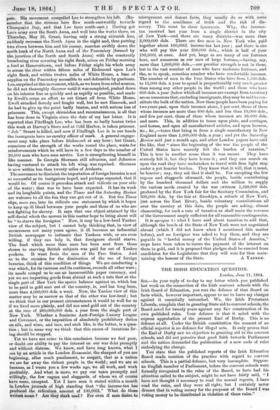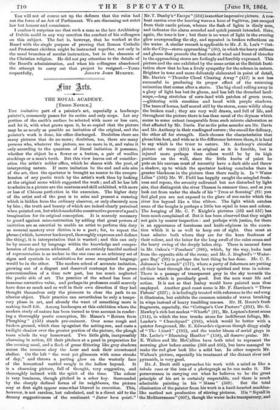THE IRISH EDUCATION QUESTION.
London, Tune 11, 1884. Sns,—In your reply of to-day to my letter which you published last week on the connection of the Irish convent schools with the Irish Board of Education, you rest the defence of that Board on facia which, however important, appear to me to leave my charges against it essentially untouched. We, the Irish Protestant Liberals, complain that in granting State aid to convent schools, the Board acted for twenty years against any fair construction of its own published rules. Yobs defence is that it acted with the express approbation of the present Earl of Derby. This is no defence at all. Under the British constitution the consent of an official superior is no defence for illegal acts. It only proves that the Earl of Derby saw no objection to granting aid to the convent schools, and did not perceive that good faith towards Parliament and the nation demanded the publication of a new code of rules embodying the change.
You state that the published reports of the Irish Education Board made mention of the practice with regard to convent schools. This is a partial defence, but very incomplete. Suppose an English member of Parliament, before the convent schools were formally recognized in the rules of the Board, to have had his attention called to the subject, might he not have fairly said, "I have not thought it necessary to read the annual reports, I have read the rules, and they were all right; but I certainly never dreamt that in voting money for the purposes of the Board I was voting money to be distributed in violation of those rules."
You will not of course set up the defence that the rules had not the force of an Act of Parliament. We are discussing not strict law but honour and conscience.
I confess it surprises me that such a man as the late Archbishop of Dublin could in any way sanction the conduct of his colleagues on this subject. The fact is, however, that he worked at the Board with the single purpose of proving that Roman Catholic and Protestant children might be instructed together, not only in the usual branches of secular instruction, but in the elements of the Christian religion. He did not pay attention to the details of the Board's administration, and when his colleagues abandoned the attempt to carry out that project he resigned.—Yours































 Previous page
Previous page